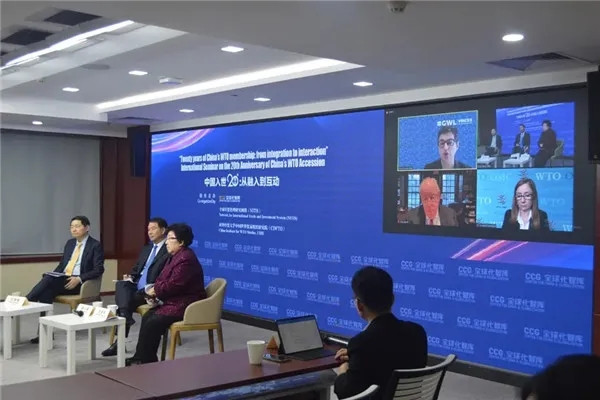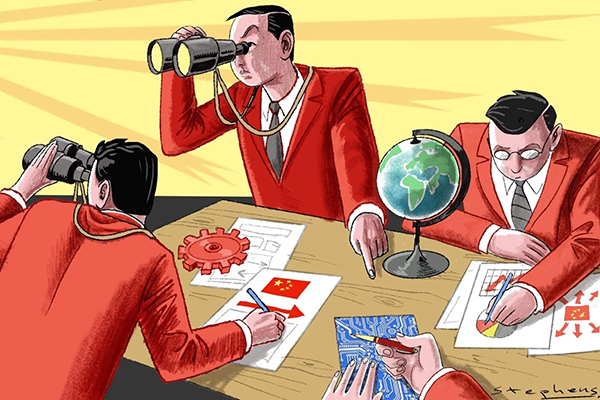Yi Xiaozhun’s Remarks at CCG Seminar on China’s accession to WTO
December 13 , 2021
The year 2021 marks the 20th anniversary of China’s accession to the WTO, an event that has brought about the unprecedented integration of a large transitional economy into the rules-based multilateral trading system. Since its entry, China has benefited significantly and become the largest trader in goods and second largest trader in services in the world today. At the same time, China’s growing involvement also has led to power shifts within the WTO and impacted on the functioning of the WTO.
In order to commemorate this anniversary and exchange intellectual wisdom to better promote China and the WTO’s shared future, Center for China and Globalization (CCG), the Network on International Trade and Investment System (NITIS) and the China Institute for WTO Studies (CIWTO) at the University of International Business and Economics (UIBE) co-hosted a hybrid discussion on December 13, 2021. This event was moderated by Wang Huiyao, CCG President and Counselor to the State Council of China. Speakers included Anabel Gonzalez, Deputy Director-General of WTO; Arancha Gonzalez Laya, former Foreign Minister of Spain; Tu Xinquan, Executive Dean and Professor, the China Institute for WTO Studies at UIBE; Alan Wolff, Distinguished Visiting Fellow at Peterson Institute for International Economics (PIIE) and former Deputy Director-General of WTO; YI Xiaozhun, former Deputy Director-General of WTO; ZHANG Yuejiao, Dean of Institute for International Dispute Settlement, Tsinghua University and former Chairperson of WTO Appellate Body.
A special address was made by YI Xiaozhun, former Deputy Director-General of WTO.

After lengthy and tough negotiations, China became a member of the World Trade Organization (WTO) in 2001, which is widely considered as a landmark economic event in modern world history. The WTO accession marked a milestone of China’s economic opening and success in the integration to the world economy. China’s trade opening, as well as global economic integration and multilateral trade rules worked together to facilitate China gaining extraordinary economic and trade growth. In return, China has proved to become an indispensable engine for the global growth, and its WTO membership has made the WTO a truly global and more relevant international organization. China’s successful accession has also inspired many other developing countries to join the WTO.
As WTO DG Okonjo-Iweala stated a couple of days ago in Geneva, “ China has become the textbook case for how global trade integration can drive growth and development. The country’s economic rise has lifted millions out of poverty, not only within China but also in China’s trading partners across the developing world.”
China’s WTO accession created a win-win outcome. For all the attention given to China’s rise as an export powerhouse, people have focused less on the question of China’s imports. From $244 billion in 2001, merchandise imports into China jumped to $2.06 trillion last year (or 12% of world merchandise trade). This is a significant contribution to the world economy, which is too often overlooked.
In order to better understand the economic implication of China’s accession, we need only to look at the China’s rank and share in the exports of major economies over time. For example, China went from being the 11th largest export destination of the United States in 2001, accounting for less than 2% of US exports, to being the country’s third largest export partner, absorbing 9% of US exports.
Among developing economies, South Africa is a representative example. China was the country’s number one export destination in 2020, up from 17th place in 2001. During this period the share of China in South Africa’s exports jumped from 1.7% to 11%. China is even more important for other emerging economies including Brazil, where nearly 32% of exports go to China.
Upon its WTO accession, China’s economy has undergone a systemic transformation and all-round opening up. The past 20 years have proven that by embracing globalization and integrating into world economy, China has successfully become a global manufacturing hub and trade centre. A wide-range of Chinese industries, particularly those that were opened up due to China’s WTO commitment, have emerged much stronger in global competition and climbed up the value chain. Keeping the same path is therefore a strategic choice for China to enhance its international positioning and avoid falling into the ‘middle-income trap’ in next decades.
The less known reason for China’s success in speedy development and industrial upgrading after its WTO accession is its proactive participation in global value chains. It’s convinced that continuous trade and investment liberalization in the future will improve the business environment, attract foreign investment and help China remain firmly embedded in global value chains. It in turn will greatly reinforce its economic resilience to withstand various crises and risks, and break the ill-founded ‘decoupling argument’.
At present, the multilateral trading system is going through the most difficult moment in its more than 70 years of history. Trade protectionism is spreading around the world. The WTO is in a deep crisis, with the vac cum of leadership, stalled multilateral negotiations, and paralyzed dispute settlement mechanism. However, an open, non-discriminatory and rules-based multilateral trading system that can keep pace with modern times is indispensable for the growth of both China and the world economy. In a multi polar world, China should promote a new pattern of collective leadership and good co-governance in the WTO. Therefor, China is needed to provide more public goods to WTO members by opening its market and promote win-win multilateral cooperation. China is also expected to stay firm in observing multilateral trade rules so as to gain the trust of the Members.
Regarding the ongoing WTO reform , China should actively participate in the process and firmly uphold open, inclusive and non-discriminatory principles, while preventing the multilateral trading system from moving toward protectionism.
In conclusion, while China’s huge achievements during 20 years of WTO membership are to be commended, the country must not rest on its successes. Our task now is to find a way to restore multilateral cooperation, keep strengthening the system and deliver new reforms. In an increasingly interdependent and multi polar world economy, it is our shared responsibility to ensure that we bolster global economic cooperation – and that we leave a strong and well-functioning trading system for the future generations.
Topical News See more






